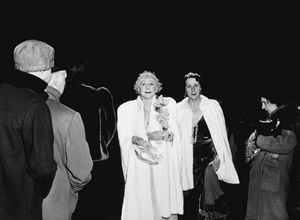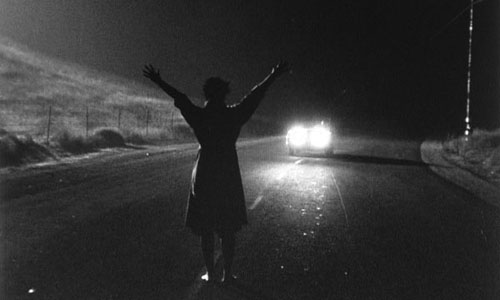 Apropos of yesterday’s posting about opera and the popular audience, a friend writes:
Apropos of yesterday’s posting about opera and the popular audience, a friend writes:
Read your post about not wanting The Letter to be Opera, but opera (if you know what I mean). Here’s the problem: the reviews won’t matter. My ex’s family is a good example: they won’t pay attention to the reviews, they won’t pay attention to ads. We took his youngest brother and sister-in-law to Carmen, another “cracking good show,” and despite enjoying it (they even knew some of the tunes), they felt so uncomfortable being at an opera they’ve never gone back.
It’s not the language problem, or the all-singing aspect (although there are those that do have a problem with that). It’s the fact that if you attend the opera, you’re somehow aligning yourself with those “snobby shiny-domes” that you don’t want to be writing yours for. Listening is one thing–but don’t actually watch (via telecast) or attend!
I know exactly what my friend is talking about. Gian Carlo Menotti’s operas played on Broadway at the height of what I call the middlebrow moment. But that age is long gone, and now it is formidably difficult to persuade ordinary people that it’s all right to like opera, or any other species of high culture–that one can enjoy Carmen and country music, literary fiction and shoot-’em-ups, abstract art and sitcoms. The problem far goes deeper than mere matters of presentation.
At the same time, though, it is essential to first get the presentation right, to avoid placing needless obstacles in the path of cultural experimentation. Greg Sandow has blogged extensively about this problem, and I agree with most of what he has to say. Very few classical-music institutions, by contrast, understand that they are now operating in a world where, as Greg puts it, “meaning…is largely expressed through popular culture.”
 Is there a place in that world for new operas like The Letter? Possibly not. But let me quote Greg again:
Is there a place in that world for new operas like The Letter? Possibly not. But let me quote Greg again:
Years ago, when I’d defected from classical music and worked as a pop music critic, and later as music editor for Entertainment Weekly, I had a girlfriend with no high art background. But she’d often say she wanted to hear classical music. One morning, while we ate breakfast, I put on some Handel. She listened for a while, and then said, “Why isn’t classical music more noir?” Referring, of course, to film noir, the complex, dark, and morally ambiguous crime films of the 1940s and ’50s, whose aesthetic now lies near the heart of our culture, though you won’t find much of it in the classical music world. Some of it, though, did slip into classical music, and so in response to my girlfriend, I put on the suite from Berg’s opera Lulu. “You mean noir like this?” I asked. “Yes,” she said. “Like that. Why doesn’t more classical music sound like that?”
 Now let me quote from Paul Moravec, my operatic collaborator: “The Letter is an opera noir, a story of ordinary people who make a few mistakes and suddenly find themselves swept into very deep emotional water, way over their heads….We intend it to be as fast-moving and hard-hitting as a Hollywood film noir from the ’40s.”
Now let me quote from Paul Moravec, my operatic collaborator: “The Letter is an opera noir, a story of ordinary people who make a few mistakes and suddenly find themselves swept into very deep emotional water, way over their heads….We intend it to be as fast-moving and hard-hitting as a Hollywood film noir from the ’40s.”
I should add, by the way, that we’re not just saying that kind of thing in order to make The Letter sound more palatable. Right from the start of our collaboration, Paul and I were thinking in terms of noir. James Cain, Raymond Chandler, Bernard Herrmann, and Sweeney Todd figured as frequently in our early conversations about The Letter as did Tosca or The Turn of the Screw.
We know what we’re up to, and we think it will make sense to under-40 audiences. But we also know that the trick will be to get them into the theater in the first place.
* * *
This posting is by a friend who accompanied Mrs. T and me to the Actors’ Shakespeare Project’s production of The Tempest in Cambridge last month. It speaks volumes about the problem of reaching out to new audiences–and how it can be solved.
